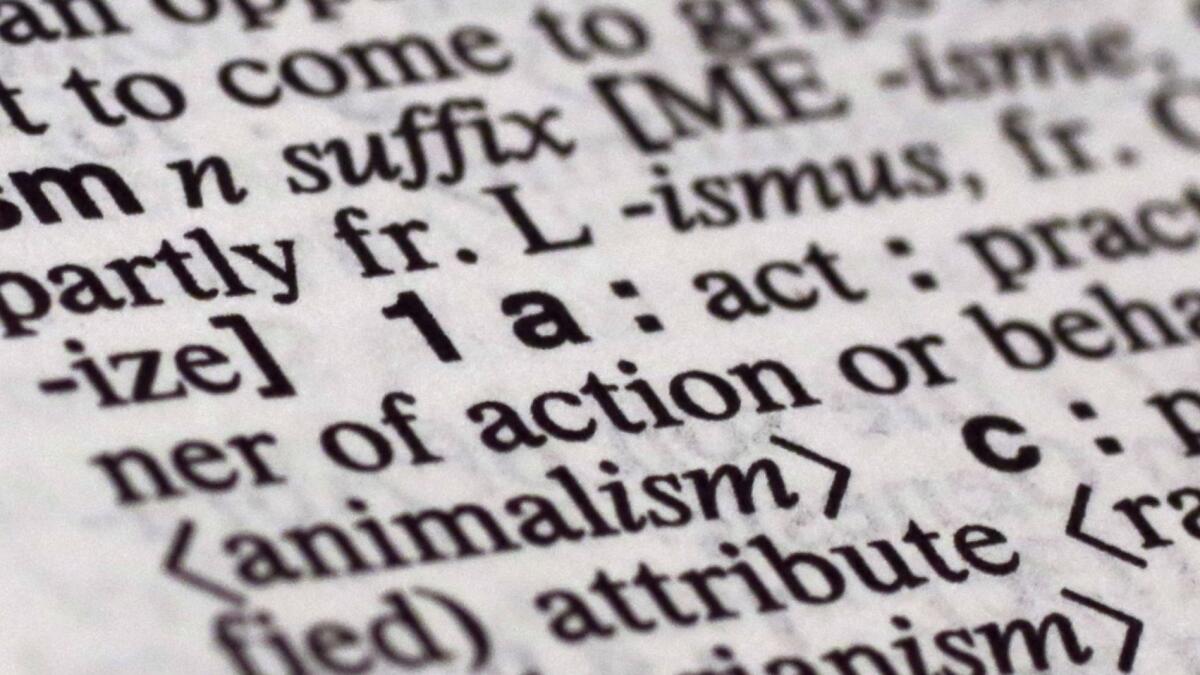A Word, Please: Read this before doubling up on punctuation marks

- Share via
“How do you feel about commas after em dashes?” a writer asked on Twitter recently. “For instance: If you want to have a great Sunday — and by ‘great’ I mean emotionally and spiritually satisfying —, then you should consider the one-hour bath.”
The question left me speechless. It’s like asking if you’d put two commas after Washington, D.C., if the name appeared in a list like, “We visited Washington, D.C.,, Chicago and Nashville.”
It’s like asking whether it’s a good idea to put an ellipsis before a colon, as in “Beth made an important observation …: the door was unlocked.”
The answer to all these questions is an emphatic “no.” The reason: Sometimes one punctuation mark can preclude the need for another. Here are some examples.
No comma with a dash
Em dashes, which are often simply called dashes, are sometimes used in place of commas. For example, you could write: Joe, a great guy, got a haircut. Or you could write: Joe — a great guy — got a haircut.
The tweeted question is a little different because it involves an introductory phrase that by itself would get a comma: “If you want to have a great Sunday, consider …”
But when you follow “Sunday” with parenthetical information set off with dashes, there’s no longer any need for a comma: If you want to have a great Sunday — and by ‘great’ I mean satisfying — consider the one-hour bath.”
No comma with a hyphen
Washington, D.C., often uses commas to set off the D.C. part. If you follow this style, you have to use two commas, one before and one after, according to the major editing styles.
So what do you do if the whole name is part of a hyphenated compound: “A Washington, D.C.-based think tank”? Drop the second comma.
No period with an exclamation point or question mark
This one’s easy. Periods, question marks and exclamation points are all in a category known as terminal punctuation, meaning punctuation at the end.
You need one to end a sentence. You don’t need two. So anytime your sentence ends in a question mark or an exclamation point, there’s no need for a period.
No colon after a comma
Similar to Washington, D.C., names like Acme, Inc., and Robert Downey, Jr., don’t always take those internal commas. Style guides often let you skip them.
But if you use them, you’ll find they can show up near a lot of punctuation marks besides dashes.
One to look out for: the colon. When a colon and a comma are vying for the same position, drop the comma. “Stella’s favorite actors besides Robert Downey, Jr.: Amy Adams and Martin Freeman.
Note that the period after Jr. stays, but the comma, whose job it is to set off information from the stuff before and after it, does not.
No question mark after a question mark in a quotation
Sometimes you need to ask a question that contains within it another question — one in quote form. Did you hear Betty ask, “What time will you be here tomorrow?” This single question mark is working for two.
Normally, a quotation within a question takes an external quotation mark: Did you hear Betty say, “You’re late”? But when the quote is a question within the question, we ditch the second question mark so the sentence doesn’t end: tomorrow?”?
No period after the period in an abbreviation
If you’re ending a sentence with M.D. or U.S. or any other abbreviation that includes periods, the abbreviation’s final period can do double duty by ending the sentence.
No comma before an ampersand
Avoid ampersands, especially in running text. But if you use one, you can dispense with any comma that normally would have appeared before the “and” your ampersand is replacing: “red, white & blue,” never “red, white, & blue.”
